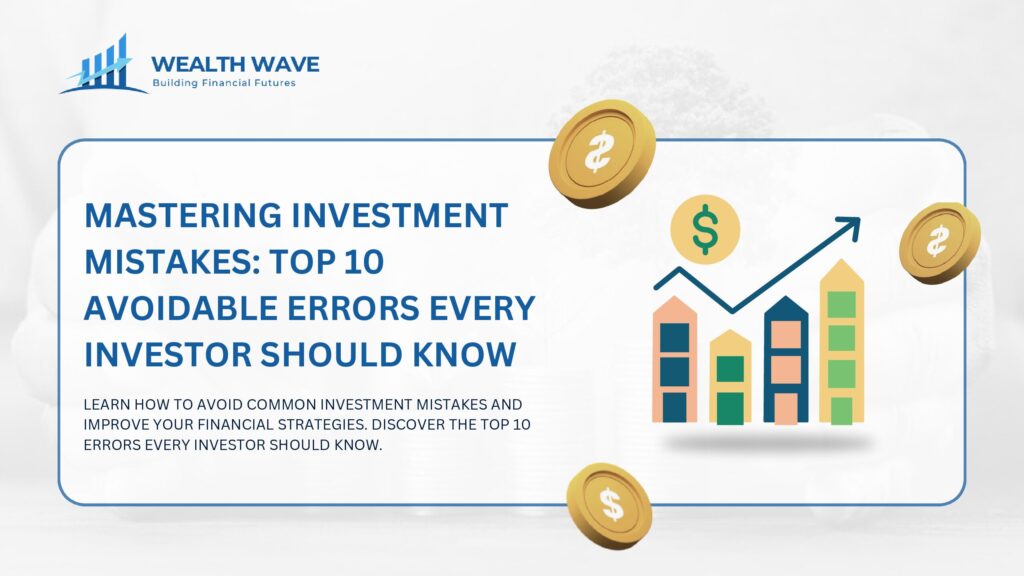Investing money can be tricky. Many people make investment mistakes without even realizing it. This leads to losing money instead of making more. To help with this, it’s good to know the top errors to avoid.
One fact about investing is that avoiding overconcentration in individual stocks or sectors is crucial for success.
This article talks about “Mastering Investment Mistakes: Top 10 Avoidable Errors Every Investor Should Know.” It covers common blunders and smart ways to steer clear of them. By learning these tips, readers can aim for better returns and less risk in their investments.
The guide also touches on how important a mix of bonds and stocks is in a portfolio.
Keep reading to see how you can dodge these pitfalls.
Key Takeaways
- Make a clear financial plan and know your risk tolerance to avoid common investment mistakes.
- Diversify your investments to reduce risk, and regularly rebalance your portfolio based on market changes.
- Stay updated on market trends, understand fees linked to investments, and make choices based on facts, not emotions.
Understanding the Top Investment Mistakes

Understanding the top investment mistakes can help investors avoid costly errors. Being aware of these pitfalls allows individuals to make better choices with their money.
Lacking a clear financial plan

Lacking a clear financial plan is one of the top investment mistakes. Investors may not see how this error affects their choices. A solid plan helps guide decisions and set goals. It gives direction for where to invest money.
Without a clear plan, investors often fall into common pitfalls in investing. They may chase performance or buy stocks without research. This can lead to overconcentration in individual stocks or sectors.
Such moves increase risk and lower potential returns. A good financial plan is vital for successful portfolio management and smart investment strategies.
Misunderstanding true risk tolerance

Misunderstanding true risk tolerance can lead to serious mistakes in investing. Investors often think they can handle more risk than they really can. This may cause them to choose high-risk stocks that do not match their comfort level.
Such decisions often result in panic during market dips. It is crucial for investors to know how much risk they are willing and able to take.
Many people overlook the importance of a balanced portfolio. Overconcentration in stocks or sectors increases potential losses when markets fall. Not understanding the difference between bonds and stocks also leads to poor choices.
A well-rounded approach helps spread the risk and boost long-term returns while managing emotional stress during downturns. The next step involves looking at the impact of these mistakes on investments.
Failing to diversify and rebalance

Investors often miss the importance of diversifying and rebalancing their portfolios. Failing to diversify can lead to overconcentration in individual stocks or sectors. This increases risk exposure.
Investors may hold too many shares of one company, putting their money at risk if that stock performs poorly.
Rebalancing is also key for managing investments well. It involves adjusting the portfolio back to its original plan after market changes. By not rebalancing, investors might end up with an unbalanced mix of assets, which can hurt potential returns.
Keeping a diverse range of investments helps protect against losses and improves overall wealth management strategies.
Trying to time the market

Trying to time the market is a common mistake among many investors. Many people think they can predict when stock prices will rise or fall. This can lead to poor choices and lost money.
Focusing on short-term gains often distracts from long-term goals. Instead of waiting for the perfect moment, investors should stick to their plans.
They must avoid jumping in or out of stocks based on emotions. Overconcentration in individual stocks can also be risky. So, diversifying one’s portfolio helps manage risk effectively.
Staying informed about market trends can guide better decisions without trying to time the market perfectly.
The next section will cover how these mistakes impact investments and financial outcomes.
Chasing performance
Chasing performance can lead to poor investment choices. Investors may jump into stocks or funds that are currently doing well, hoping for quick gains. This often results in overconcentration in individual stocks or sectors, increasing risk exposure.
Many people do not realize this mistake can impact their overall returns negatively.
Focusing on short-term performance ignores the importance of a balanced portfolio. A smart investor should stay committed to a long-term plan instead of reacting to market swings. Being aware of fees and expenses is also crucial during this process.
Understanding these factors helps avoid common investment errors and supports better financial planning overall.
Ignoring fees and expenses
Chasing performance can lead to poor choices. Ignoring fees and expenses is another mistake investors often make. Many people overlook how much these costs eat into their returns. High advisory fees or costly investment funds can greatly reduce profits over time.
It’s crucial for investors to be aware of all expenses related to their investments.
Investors should pay attention to the difference between bonds and stocks in an investment portfolio. Each has its own set of fees that can affect overall performance. Individuals must calculate these costs when creating a clear financial plan.
By understanding all fees, they can avoid common investment blunders and improve their chances for better returns on investment.
Making emotional decisions
Making emotional decisions can lead to poor investments. Investors often let feelings guide their choices. This can result in buying high or selling low. Emotional mistakes are common errors that hurt returns.
Often, investors chase performance based on fear or greed. They may ignore facts and trends when making choices.
Investors should stay calm and think logically. Overcoming investment mistakes requires clear planning and sound judgment. By sticking to a financial plan, they can avoid these pitfalls.
It is vital for every investor to recognize the impact of emotions on decision-making in stock market investing and risk management.
Not staying informed
Not staying informed can hurt an investor’s choices. Many investors make common errors in investment by ignoring market news or trends. This lack of knowledge leads to poor decisions and missed chances for profit.
Investors may fail to notice important changes in the market that could affect their portfolios. They might hold onto stocks that are losing value because they do not know what’s happening.
Smart investment blunders often arise from this error. Staying updated allows investors to react quickly and wisely. It helps them understand if a stock is still worth holding or should be sold.
To avoid typical investment mistakes, one must stay aware of new information and updates about their investments and the overall market landscape. Understanding the differences between bonds and stocks can also aid in effective asset allocation, ensuring better long-term gains.
The Impact of These Mistakes on Your Investments

Investment mistakes can hurt your finances. They may lead to lower returns and more risks.
Loss of potential returns
Investors face a loss of potential returns when they make common mistakes. Overconcentration in individual stocks or sectors can hurt them. Putting too much money into one stock increases risk and limits gains.
Investors might not realize they own stocks they do not want. This can lead to poor decisions that impact their profits.
Focusing on short-term performance also causes issues. Chasing trends without a solid plan may result in missed opportunities for growth over time. These choices create emotional strain, which influences investor behavior negatively.
Understanding these pitfalls is key to building a successful investment strategy and avoiding avoidable investment mistakes like these.
Increased risk exposure
Loss of potential returns can lead to increased risk exposure. Many investors make the mistake of putting too much money into a single stock or sector. This overconcentration creates more risk if that investment performs poorly.
Smart investment blunders often happen because investors fail to diversify their portfolios. They may hold stocks they do not really want, leading to poor decisions.
Bonds versus stocks in a portfolio is another key point. Investors should balance both types to lower risks and improve returns. Staying informed helps avoid common investment errors like this one.
With proper education, individuals can sidestep investment mistakes and protect themselves from greater losses.
Higher fees and expenses
Higher fees and expenses can hurt an investor’s returns. Many people do not think about how much they pay to manage their investments. High fees can eat away at profits over time.
This is a common investment mistake that beginners often overlook.
Investors should watch for hidden costs in their portfolios. These costs may come from trading, management, or fund expenses. Ignoring these fees can lead to poor investment decisions and lower overall gains.
Keeping an eye on expenses helps investors achieve better results in the long run.
Emotional strain
Emotional strain can take a heavy toll on investors. Making decisions based on feelings often leads to poor choices. Many fail to stick with their plans during market ups and downs.
This stress can cause people to sell stocks they don’t want or need, which only adds to the confusion. Such mistakes fall into common investment errors that could have been avoided.
Investors should focus on rational thoughts instead of emotions. Being aware of these pitfalls helps reduce emotional strain in investing. A strong financial plan can guide decisions and keep anxiety at bay.
Understanding personal risk tolerance also lessens pressure when facing market changes.
How to Avoid These Common Investment Mistakes

4. How to Avoid These Common Investment Mistakes: Investors can create a strong plan and understand their risk level to make smart choices. Staying updated on the market is key too.
For more tips on avoiding pitfalls, continue reading.
Develop a clear financial plan
A clear financial plan is essential for all investors. It helps define goals and outlines steps to reach them. Investors should know their risk tolerance before investing in stocks or bonds.
This knowledge prevents mistakes like overconcentration in certain sectors. A good plan includes regular reviews to keep investments balanced. Failing to have a solid plan can lead to emotional decisions and poor performance.
Investors may chase short-term gains without understanding risks involved. Having a clear strategy helps avoid this pitfall. Also, staying informed about market trends is vital for making smart choices.
Using investment education resources can guide beginners through common investment errors to avoid, leading them toward better returns over time.
Understand your risk tolerance
A clear financial plan helps investors stay on track. After that, understanding risk tolerance is vital. Risk tolerance means knowing how much risk one can handle in investments. Each person reacts differently to market changes.
Some may feel anxious when prices drop, while others remain calm. This difference affects investment choices and potential returns. Investors must identify their comfort level with losses and gains.
They should consider factors like age, income, and goals. By doing this, they can avoid beginner investing mistakes.
Choosing the right mix of bonds and stocks in a portfolio also matters. Knowing one’s risk tolerance helps prevent overconcentration in individual stocks or sectors. Informed decisions lead to better outcomes in investing for the long term.
Diversify and rebalance your portfolio regularly
Diversifying a portfolio is key for smart investing. It helps spread risk across different types of assets, like stocks and bonds. This prevents heavy losses if one investment fails.
Keeping a mix of investments can boost chances for better returns.
Rebalancing is also important. Markets change, and some investments may grow faster than others. Regularly adjusting the portfolio keeps it aligned with financial goals. Sticking to this process can help investors avoid common missteps and work towards stable growth over time.
Avoid trying to time the market
Investors often try to time the market. They want to buy low and sell high. This approach can lead to missed opportunities. Many do not realize they are making a mistake by chasing performance.
Trying to predict market movements is very hard. It causes anxiety and may lead to poor decisions.
Timing the market increases risk exposure. Investors might miss strong returns during upswings. Long-term success comes from steady investments rather than short-term moves. A well-diversified portfolio helps reduce these risks, whether it includes bonds or stocks in the mix.
Making informed choices matters more than attempting quick gains or reacting emotionally to trends in investment psychology.
Focus on the long-term rather than chasing short-term performance
Investors should focus on the long-term. Chasing short-term performance can lead to poor decisions. Many individuals fall into this trap without realizing it. They often react to market shifts and trends instead of sticking to their plans.
A clear financial plan helps guide investors through ups and downs. Staying committed leads to stronger returns over time. Avoiding rush decisions allows for better overall results in an investment portfolio.
Understanding the differences between bonds and stocks also aids in making wiser choices for long-term growth.
Be aware of fees and expenses
Chasing short-term performance can lead to overlooking important costs. Being aware of fees and expenses is crucial for investors. High fees can eat into potential returns over time.
Even small costs add up quickly, reducing overall profits. Investors should look closely at all charges linked to their investments.
Ignoring these costs can lead to poor investment decisions. Many people do not realize how much they pay in fees, which might affect their portfolio’s growth. Understanding the difference between bonds and stocks in a portfolio also helps clarify expenses involved with each type of investment.
This awareness enables more informed choices and better long-term results, helping avoid common mistakes that hinder success in investing.
Make informed, rational decisions rather than emotional ones
Investors should focus on making informed and rational decisions. Emotional choices can lead to mistakes in investing. Many people chase performance based on fear or greed, which is not smart.
This behavior often leads to poor investment choices and losses. Individuals may end up owning stocks they do not want, which adds to their stress.
To avoid these issues, investors need to understand the importance of keeping emotions in check. A clear financial plan helps guide decisions. Staying aware of market trends will also help investors make better choices over time.
By being informed about different investments like bonds vs stocks in a portfolio, they can sidestep common investment mistakes effectively. The way forward involves understanding the top investment pitfalls that exist today and how best to navigate them for success.
Stay informed about market trends and updates
Making informed decisions is crucial. Staying updated on market trends helps investors avoid mistakes. A study by Visual Capitalist highlights the 20 most common investing errors. Many people do not realize they are making these mistakes.
Investors should focus on understanding the differences between bonds and stocks in their portfolio. An overconcentration in individual stocks can lead to problems. Owning unwanted stocks may also result in poor choices.
Regularly checking market updates keeps investors aware of changes that could affect their investments. By staying informed, they can sidestep investment pitfalls and enhance their chances for success.
Conclusion: Becoming a Master Investor: Key Takeaways on Avoiding Investment Mistakes

Investors should focus on key strategies to avoid common mistakes. They need a clear financial plan and an understanding of their risk tolerance. Diversifying investments helps reduce risk.
Avoiding emotional choices leads to better decisions. Paying attention to fees can improve overall returns. Using these tips will help investors succeed in the long run.
For more guidance, readers can explore investment books or online resources. Continuous learning is important for growth and success in investing. Taking action now can lead to significant benefits later.
Investors should remember that small changes today can have a big impact tomorrow.
FAQs
Q1. What are some common investment mistakes to avoid?
Ans. Common investment missteps include not understanding the difference between bond vs stock in a portfolio, and not taking heed of sound investment advice.
Q2. How can I sidestep these errors in my investments?
Ans. To sidestep these errors, you need to learn about ways to avoid investment mistakes, such as diversifying your portfolio and seeking professional advice.
Q3. What should I watch out for when investing?
Ans. You should always be on the lookout for potential pitfalls in your investments. This could include market fluctuations or making decisions based on emotions rather than facts.
Q4. Is there any guide that can help me overcome these investment errors?
Ans. Yes, mastering "Investment Mistakes: Top 10 Avoidable Errors Every Investor Should Know" will provide valuable insights into overcoming common errors and avoiding future ones.




